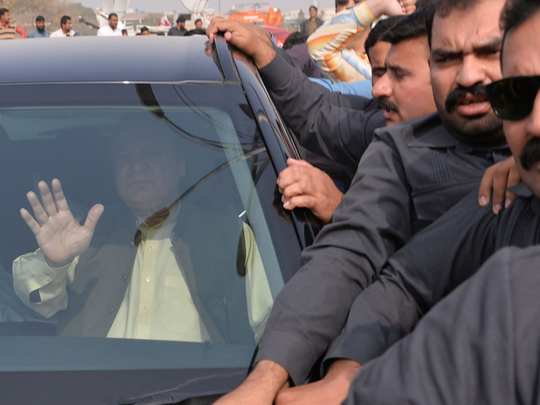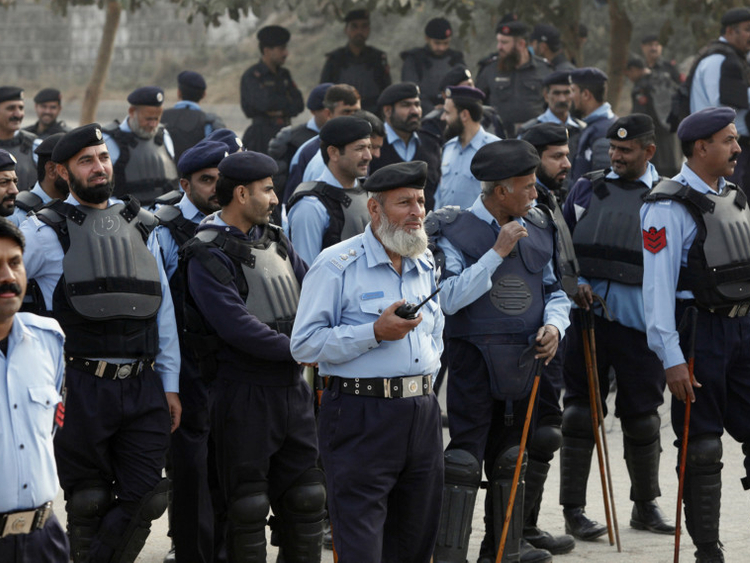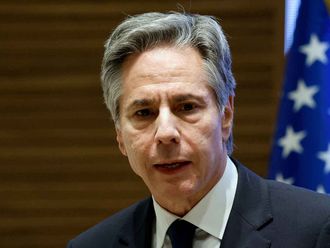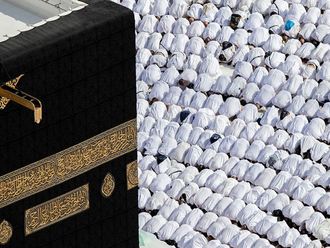
Islamabad: A Pakistani anti-graft court on Wednesday rejected ousted prime minister Nawaz Sharif’s plea to club together three corruption cases against him and used his presence to once again indict him in the Panama Papers case.
The three cases were registered by the National Accountability Bureau (NAB) on September 8 against Sharif, his children and son-in-law in the Accountability Court Islamabad, following a verdict by the Supreme Court on July 28.
Sharif, 67, had to step down after he was disqualified as the prime minister by the apex court in the Panama case.
Now, Sharif will have to face three separate trials with hearings stretching out for months.
Sharif was called to the rostrum and the charge sheets in three cases were read to him.
The former prime minister pleaded not guilty to all the charges and contented that he was being deprived of the fair trial as the court was moving in a hurry to decide the case in six months as per direction of the Supreme Court.
Rejecting the plea, Accountability Court Judge Muhammad Bashir said that Sharif would be given fair trial under the law and then postponed the hearing till November 15.
Heavy security arrangements were made and hundreds of security personnel deployed around the court premises to deal with any untoward situation.
Sharif later told media that Wednesday’s verdict would be written in “black words” in Pakistan’s history.
“I knew that review petition will not be decided in my favour because the judges (who issued the verdict in review petition) are full of vengeance and the decision reflects vengeance and anger. This will become part of black pages of history,” Sharif said.
“There are several black pages in the last 70 years of Pakistan history when there were dictators. This judgement (of review petition) will also be written in black words,” he said.
Sharif, his daughter Maryam and her husband Capt (retd) Muhammad Safdar were present in the court to hear the verdict.
The accountability court had reserved its judgement on Tuesday after hearing the arguments by both sides.
Judge Bashir said that Supreme Court in its judgement had asked to institute three cases as they deal with different money trails and sources of money.
The court heard the case for the second time after an order by the Islamabad High Court, which last week asked the trial judge to hear the cases and record the judgement in detail.
Sharif’s lawyer Khawaja Harris had argued that all three cases deal with assets beyond means and allegations and most of witnesses are same, so the references should be taken as one.
But NAB lawyer Sardar Muzaffar Abbasi opposed the move.
Former NAB prosecutor Raja Amir Abbas said that Sharif can challenge the rejection of application in the high court.
“Now the trial will resume from where it was stopped to decide the application by Sharif,” he said.
The accountability court on October 19 rejected a similar application by Sharif to convert three cases into one. The rejection was challenged in the Islamabad High Court which referred the case to accountability court with direction to reconsider it.
The apex court on Tuesday said Sharif’s disqualification was “uncontroversial” and issued a detailed verdict rejecting review petitions filed by the Sharif family in the Panama Papers case.
In its detailed 23-page verdict, the apex court observed that no error has been identified in the Panama case, which could be reviewed and the accountability court is free to make a decision on the basis of nature of evidence.
Sharif was indicted last month through his representative Zaafir Khan as he was away in London to take care of his wife Kulsoom who is battling with throat cancer.
It is not clear whether Sharif would be present on the next hearing as he is already filed an application to let him appoint his pleader to represent him in his absence. The court has yet to decide the case.
The political future of Sharif, who leads the country’s most powerful political family and the ruling PML-N party, has been hanging in balance since the July 28 verdict.













